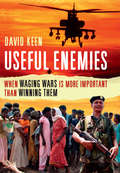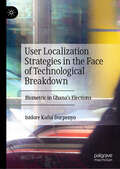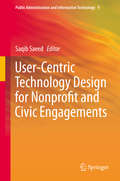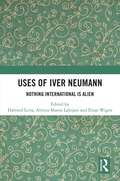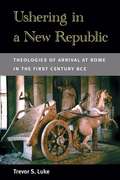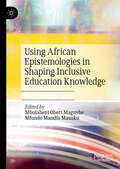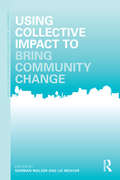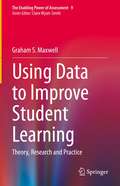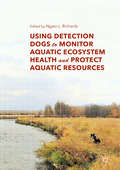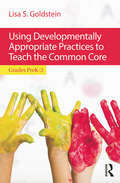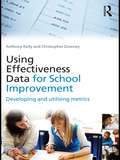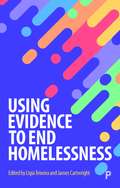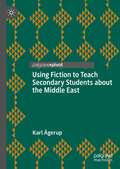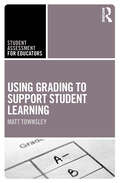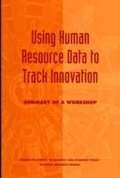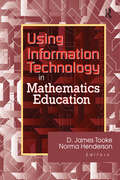- Table View
- List View
Useful Enemies
by David KeenThere are currently between twenty and thirty civil wars worldwide, while at a global level the Cold War has been succeeded by a "war on drugs" and a "war on terror" that continues to rage a decade after 9/11. Why is this, when we know how destructive war is in both human and economic terms? Why do the efforts of aid organizations and international diplomats founder so often? In this important book David Keen investigates why conflicts are so prevalent and so intractable, even when one side has much greater military resources. Could it be that endemic disorder and a "state of emergency" are more useful than bringing conflict to a close? Keen asks who benefits from wars--whether economically, politically, or psychologically—and argues that in order to bring them successfully to an end we need to understand the complex vested interests on all sides.
Useful Idiots: How Liberals Got It Wrong in the Cold War and Still Blame America First
by Mona CharenThe original BESTSELLER from nationally syndicated columnist Mona Charen! Who’s on the wrong side of history? The liberals who are always willing to blame America first and defend its enemies. They've tried to rewrite history, but Mona Charen won't let them as she calls out liberal hypocrisy during the Cold War and afterward; from DC elites like Hillary Clinton, John Kerry, and Jimmy Carter to Hollywood celebs like Woody Allen, Jane Fonda, and Martin Sheen to academic snobs like Noam Chomsky, Susan Sontag, and many more. Charen's devastating critique of the left's philosophical incompetence is a must-read for Americans on both sides of the aisle.
User Centric E-Government
by Zaigham Mahmood Saqib Saeed T. RamayahThis book provides user studies and theories related to user-centered technology design processes for e-government projects. The book mainly discusses inherent issues of technology design implications, user experiences, and guidelines for technology appropriation. Ethnographic studies focusing on real life examples will enable readers to understand the problems in an effective way. Furthermore, the theories and results will help researchers and practitioners to handle these challenges in an efficient way. E-Government is about harnessing the information revolution to improve the efficiency of government processes and the lives of citizens. It aims at a citizen centered approach to governance through effective use of the Internet and Information and Communication Technologies (ICTs). E-Government promotes transparency and effectiveness of a government's processes as well as citizens' participation (e-participation) in the affairs of the government. Whereas E-government projects are huge undertakings for government departments, a user-centric approach requires citizens' participation in the design and delivery of e government services. In both these respects, there are huge challenges and governments require long term commitment as well as correct planning and availability of financial resources to address them. System design for e-governmental applications is inherently a complex process. In successful e-government projects, appropriately designed technology infrastructure plays a pivotal rule. The technology appropriation process requires that e-government technologies should be in line with the work practices of end users, so that successful usage of these technologies can be realized. E-governmental systems which fail to take into account such human factors result in failure and wasting huge amounts of public money as well as a loss of confidence of the public in such technological infrastructures. It is highly important that citizens are enabled to have access to the appropriate information technology, have knowledge and skills to use the available technology, and have the positive commitment to affect the governments' strategies. So, enabling citizens to effectively participate is much more difficult. This book addresses these inherent challenges and available opportunities with respect to user-centric e-government.
User Localization Strategies in the Face of Technological Breakdown: Biometric in Ghana’s Elections
by Isidore Kafui DorpenyoThis book examines Ghana’s use of the fingerprint biometric technology in order to further conversations about localization championed by technical communication scholars. Localization, in this case, refers to the extent to which users demonstrate their knowledge of use by subverting and reconfiguring the purpose of technology to solve local problems. Dorpenyo argues that the success of a technology depends on how it meets the users’ needs and the creative efforts users put into use situations. In User Localization Strategies in the Face of Technological Breakdown, Dorpenyo advocates studying how users of technological systems construct knowledge about the technology and develop local strategies to solve technological breakdowns. By analyzing technical documents and interview transcripts, the author identifies and advances three user localization strategies: linguistic localization, subversive localization, and user-heuristic experience localization, and considers how biometric systems can become a tool of marginalization.
User-Centric Technology Design for Nonprofit and Civic Engagements
by Saqib SaeedDue to the increased global political importance of the nonprofit sector, its technological support and organizational characteristics have become important fields of research. In order to conduct effective work, nonprofits need to communicate and coordinate effectively. However, such settings are generally characterized by a lack of resources, an absence of formal hierarchical structures and differences in languages and culture among the activists. Modern technologies could help nonprofit networks in improving their working. In order to design appropriate technological support for such settings, it is important to understand their work practices, which widely differ from traditional business organizations. This book aims to strengthen the body of knowledge by providing user studies and concepts related to user centered technology design process for nonprofit settings. The examination of ethnographic studies and user centered evaluation of IT artifacts in practice will further the understanding of design requirements of these systems. This book includes chapters from leading scholars and practitioners on the technology design process examining human centered factors. The chapters will focus on developed and developing countries as they both have unique issues in technology design. The book will be useful or of interest to academics from a range of fields including information systems, human computer interaction, computer supported cooperative work and organizational science as well as for government officials and governmental organizations.
Username: Evie
by Joe SuggBOOK 1 IN THE USERNAME SERIES BY JOE SUGGLike anyone who feels as though they just don't fit in, Evie dreams of a place of safety. When times are tough, all she wants is a chance to escape from reality and be herself. Despite his failing health, Evie's father comes close to creating such a virtual idyll. Passing away before it's finished, he leaves her the key in the form of an app, and Evie finds herself transported to a world where the population is influenced by her personality. Everyone shines in her presence, until her devious cousin, Mallory, discovers the app... and the power to cause trouble in paradise.
Username: Evie
by Joe SuggFeaturing an exclusive interview with Joe, plus a sneak preview of USERNAME: REGENERATED.Like anyone who feels as though they just don't fit in, Evie dreams of a place of safety. When times are tough, all she wants is a chance to escape from reality and be herself. Despite his failing health, Evie's father comes close to creating such a virtual idyll. Passing away before it's finished, he leaves her the key in the form of an app, and Evie finds herself transported to a world where the population is influenced by her personality. Everyone shines in her presence, until her devious cousin, Mallory, discovers the app... and the power to cause trouble in paradise.(P) 2016 Hodder & Stoughton
Uses of Iver Neumann: Nothing International is Alien
by Einar Wigen Halvard Leira Alireza Shams LahijaniThis book engages with the work of Iver B. Neumann, demonstrating the past, present, and future importance of his work as a central IR scholar who set a path for younger researchers to make sense of international relations beyond traditional bounds.By closely examining his work, some of the leading contemporary political scientists reflect on the eclecticism that embodies Neumann’s theorisation. Expert contributors engage in a critical review of his work on identity, practice theory, discourse, knowledge production, mentoring, and methodology, looking beyond the person to say something about the state of the field and the craft of research altogether. These reflections engage in critical assessment of the state of International Relations as a discipline, taking stock of theoretical and methodological challenges that scholars face, and reviewing the changes and continuities in knowledge production within social sciences.This book would be of interest to students, researchers, and educators working on themes of diplomacy, anthropology, popular culture, identity, foreign policy, and knowledge production and introducing them to the state of the discipline, key texts, and key developments over the past 30 years.
Uses of the West
by Gunther Hellmann Benjamin HerborthThe notion of 'the West' is commonly used in politics, the media, and in the academic world. To date, our idea of 'the West' has been largely assumed and effective, but has not been examined in detail from a theoretical perspective. Uses of 'the West' combines a range of original and topical approaches to evaluate what 'the West' really does, and how the idea is being used in everyday political practice. This book examines a range of uses of 'the West', and traces how 'the West' works in a broad array of conceptual and empirical contexts, ranging from the return of geopolitics - via a critical review of the debates surrounding Samuel Huntington's Clash of Civilization thesis - to the question of the future of 'the West'. Analysis extends further to the repercussions of the war on terror on Western democracy and the processes of delineating the Western from the non-Western, as well as observations of the institutional transformations of Western order.
Ushering In A New Republic: Theologies Of Arrival At Rome In The First Century Bce
by Trevor S. LukeThe ancient Romans are well known for their love of the pageantry of power. No single ceremony better attests to this characteristic than the triumph, which celebrated the victory of a Roman commander through a grand ceremonial entrance into the city that ended in rites performed to Rome's chief tutelary deity, Jupiter Optimus Maximus, on the Capitoline hill. The triumph, however, was only one form of ceremonial arrival at the city, and Jupiter was not the only god to whom vows were made and subsequently fulfilled at the end of a successful assignment. Ushering in a New Republic expands our view beyond a narrow focus on the triumph to look at the creative ways in which the great figures of Rome in the first century BCE (men such as Sulla, Caesar, Augustus, and others) crafted theological performances and narratives both in and around their departures from Rome and then returned to cast themselves in the role of divinely supported saviors of a faltering Republic. Trevor S. Luke tackles some of the major issues of the history of the Late Republic and the transition to the empire in a novel way. Taking the perspective that Roman elites, even at this late date, took their own religion seriously as a way to communicate meaning to their fellow Romans, the volume reinterprets some of the most famous events of that period in order to highlight what Sulla, Caesar, and figures of similar stature did to make a religious argument or defense for their actions. This exploration will be of interest to scholars of religion, political science, sociology, classics, and ancient history and to the general history enthusiast. While many people are aware of the important battles and major thinkers of this period of Roman history, the story of its theological discourse and competition is unfolded here for the first time.
Using African Epistemologies in Shaping Inclusive Education Knowledge
by Mbulaheni Obert Maguvhe Mfundo Mandla MasukuThis book thus explores the role of African epistemologies in addressing the myriad challenges posed by the inclusive education system in Africa and other contexts. In recent years, the shift from special education to inclusive education has had a significant impact on the provision of education and the education system as a whole in Africa. The impact has been felt in all institutions of learning from low to high, public and private, government, and across departments of education. Inclusive education, if shaped correctly by using African epistemologies, would empower learners to attain the relevant skills, knowledge, values, and attitudes for their own intellectual growth and personal development.
Using Collective Impact to Bring Community Change (Community Development Research and Practice Series)
by Norman Walzer Liz WeaverCollective Impact as a tool to bring about community change has seen remarkable growth in usage since 2011. Collective Impact has been used successfully with a variety of local issues and has raised the consciousness of how community groups interact as well as the approaches that can lead to long-term innovations. This edited volume sets forth conceptual foundations for using Collective Impact as well as sharing basic approaches that have succeeded in projects under diverse circumstances. It will be useful for both academics and practitioners as Collective Impact continues to undergo substantial changes in focus and direction. Building on Kania and Kramer’s influential work, it provides readers with detailed insights not only into how the Collective Impact system works but also innovative applications to issues facing community developers. The diverse topics shared by the contributing authors make this volume especially important for practitioners designing programs to bring about long-term changes in their communities. Including discussion about how Collective Impact has succeeded in different governmental settings, this book demonstrates how Collective Impact has been modified to accommodate the associated cultural differences with 10 chapters written by experienced on-the-ground community development experts.
Using Data Sharing to Improve Coordination in Peacebuilding: Roundtable on Technology, Science, and Peacebuilding
by Andrew RobertsonOn May 23, 2012, the Roundtable on Technology, Science, and Peacebuilding convened a workshop at the United States Institute of Peace (USIP) to investigate data sharing as a means of improving coordination among US government and nongovernment stakeholders involved in peacebuilding and conflict management activities. Using Data Sharing to Improve Coordination in Peacebuilding:Report of a Workshop by the National Academy of Engineering and the United States Institute of Peace: Roundtable on Technology, Science, and Peacebuilding addresses the following question: What needs must a data sharing system address to create more effective coordination in conflict zones and to promote the participation of federal agencies and nonfederal organizations in Peacebuilding? In addition, the workshop served as a means to obtain feedback on the UNITY system, a data-sharing platform developed by the Department of Defense (DOD) and the United States Agency for International Development (USAID). The Roundtable was established in 2011 as a partnership between USIP and the National Academy of Engineering (NAE) to make a measurable and positive impact on conflict management, peacebuilding, and security capabilities by bringing together leaders from the technical and peacebuilding communities. Its members are senior executives and experts from leading governmental organizations, universities, corporations, and nongovernmental organizations. Its principal goals are: 1. To accelerate the application of science and technology to the process of peacebuilding and stabilization; 2. To promote systematic, high-level communication between peacebuilding and technical organizations on the problems faced and the technical capabilities required for successful peacebuilding; and 3. To collaborate in applying new science and technology to the most pressing challenges faced by local and international peacebuilders working in conflict zones. The Roundtable is strongly committed to action-oriented projects, and the long-term goal of each is to demonstrate viability with a successful field trial. The Roundtable has selected a portfolio of high-impact peacebuilding problems on which to focus its efforts: 1. Adapting agricultural extension services to peacebuilding, 2. Using data sharing to improve coordination in peacebuilding, 3. Sensing emerging conflicts, and 4. Harnessing systems methods for delivery of peacebuilding services.
Using Data to Improve Student Learning: Theory, Research and Practice (The Enabling Power of Assessment #9)
by Graham S. MaxwellThis book offers a coherent research-based overview and analysis of theories and practices in using data to improve student learning. It clarifies what 'use of data' means and differentiates the different levels of decision-making in education (relating to the system, district, school, classroom, or individual student). The relationship between data and decision-making is considered and various movements in the use of data to improve student learning are analysed, especially from the perspective of their assumptions and effects. This leads to a focus on effective educational decision-making as a social process requiring collaboration among all relevant participants. It also requires a clear understanding of educational aims, and these are seen to transcend what can be assessed by standardised tests. The consequences of this analysis for decision processes are explored and conclusions are drawn about what principles might best guide educational practice as well as what ambiguities remain. Throughout, the focus is on what existing research says about each of the issues explored.
Using Detection Dogs to Monitor Aquatic Ecosystem Health and Protect Aquatic Resources
by Ngaio L. RichardsThis book is about the varied range of emerging applications using specially trained detection dogs to monitor and protect aquatic ecosystems, animals, plants and related resources. Featuring contributions from those at the forefront of converging disciplines ranging from canine training, ecological and biological monitoring, water resource management, law enforcement, and eco-toxicology, it addresses everyone already immersed in these or related fields, and anyone seeking to gain a broader understanding of them. Chapters cover several common themes including monitoring presence/absence through biological and ecological surveys; maintaining and evaluating water quality; law enforcement and anti-poaching initiatives; public education, awareness and compliance; standards and best practices; optimal uses of dogs in relation to and in conjunction with other available tools and pragmatic considerations for selecting and working with dogs and handlers. The aim of the book is to stimulate new ideas, promote the sharing and dissemination of information and findings - and, ideally, to catalyze new and innovative partnerships, to strengthen the preservation and conservation of our aquatic heritage.
Using Developmentally Appropriate Practices to Teach the Common Core: Grades PreK–3
by Lisa S. GoldsteinUsing Developmentally Appropriate Practices to Teach the Common Core: Grades PreK–3 provides current and prospective primary grade teachers with an understanding of the CCSS-ELA and CCSS-M that highlights their compatibility with developmentally appropriate practices (DAP), the instructional approach generally preferred by teachers of young children. The book begins by framing the CCSS as a distinct improvement over lengthy lists of academic content standards and as a carefully conceptualized and DAP-friendly set of curriculum guidelines. Next, the CCSS-ELA and CCSS-M for Grades K–3 are unpacked, analyzed, synthesized, and cross-referenced to key features of DAP. Finally, several "hot topic" issues—differentiating instruction to meet the needs of all learners, ensuring equitable access to the curriculum for English Language Learners, addressing assessment and accountability expectations, and educating parents and families about the CCSS and DAP—are prioritized and examined in depth. Using Developmentally Appropriate Practices to Teach the Common Core: Grades PreK–3 is a highly useful guide for both pre-service and in-service early childhood education teachers.
Using Effectiveness Data for School Improvement: Developing and Utilising Metrics
by Anthony Kelly Christopher DowneyData metrics in schools are becoming increasingly complex, but despite their best efforts, teachers and academics generally find them something of a ‘black-box’. This book lifts the lid on that box, exploring the provenance and problematization of existing techniques and developing new algorithms for measuring the more oblique aspects of in-school performance. Using contextual value-added measures in England as a foundation - they have become the template of choice for policy-makers around the world and a basis for some excellent school effectiveness research - the book explores the potential of performance and progress data to guide student and teacher self-evaluation, to set targets and allocate resources, to evaluate initiatives and identify good practice, to assess and reward staff responsibility, and to inform policy in relation to emerging issues like school choice, equality of opportunity and post-compulsory progression. Chapters are sectioned in three parts - ‘Past’, ‘Present’ and ‘Future’ - and cover: the historical journey from raw-threshold to refined-contextual measures of school effectiveness research and policy on pupil attainment and value-added data the leading UK government and Fischer Family Trust models issues relating to differential effectiveness and the interpretation of data how best to blend data from different sources new non-cognitive metrics for assessing social and emotional aspects of learning (SEAL) and staff responsibility managing data for school improvement and understanding professional attitudes to it. Using Effectiveness Data for School Improvement brings together for the first time in one place the various metrics and models, and their basis in research. A full technical specification is included so that both ‘data experts’ and ‘data novices’, academics and practitioners, can use the book to understand and maximize what is potentially a hugely transforming, but under-utilized, resource and an increasingly important aspect to school and curriculum management.
Using Evidence in Policy and Practice: Lessons from Africa (Rethinking Development)
by Ian Goldman Mine PabariThis book asks how governments in Africa can use evidence to improve their policies and programmes, and ultimately, to achieve positive change for their citizens. Looking at different evidence sources across a range of contexts, the book brings policy makers and researchers together to uncover what does and doesn’t work and why. Case studies are drawn from five countries and the ECOWAS (west African) region, and a range of sectors from education, wildlife, sanitation, through to government procurement processes. The book is supported by a range of policy briefs and videos intended to be both practical and critically rigorous. It uses evidence sources such as evaluations, research synthesis and citizen engagement to show how these cases succeeded in informing policy and practice. The voices of policy makers are key to the book, ensuring that the examples deployed are useful to practitioners and researchers alike. This innovative book will be perfect for policy makers, practitioners in government and civil society, and researchers and academics with an interest in how evidence can be used to support policy making in Africa.
Using Evidence to End Homelessness
by Lígia Teixeira and James CartwrightAvailable open access under CC-BY-NC license. Homelessness is unequivocally devastating. In the UK, people affected by homelessness are ten times more likely to die than their peers in the general population, yet we still miss important opportunities to adequately address the issue. The Centre for Homelessness Impact brings together this urgent book gathering the insights and experiences of leaders in government, academia and the third sector to present new evidence-based strategies to end homelessness. Demonstrating why and how a new movement is needed that embraces data and evidence as integral to ending homelessness effectively, this book provides crucial methods to underpin future policy, practice and funding decisions.
Using Existing Platforms to Integrate and Coordinate Investments for Children
by Steve OlsonThe integration and coordination of health, education, nutrition, social protection, and other services have the potential to improve the lives of children and their caregivers around the world. However, integration and coordination of policies and programs affecting early childhood development can create both risks and benefits. In different localities, these services are more or less effective in achieving their objectives. They also are more or less coordinated in delivering services to the same recipients, and in some cases services are delivered by integrated multisectoral organizations. The result is a rich arena for policy analysis and change and a complex challenge for public- and private-sector organizations that are seeking to improve the lives of children. To examine the science and policy issues involved in coordinating investments in children and their caregivers, the Forum on Investing in Young Children Globally held a workshop in Hong Kong on March 14-15, 2015. Held in partnership with the Centre for Health Education and Health Promotion and Wu Yee Sun College of the Chinese University of Hong Kong, the workshop brought together researchers, policy makers, program practitioners, and other experts from 22 countries. This report highlights the presentations and discussions of the event.
Using Fiction to Teach Secondary Students about the Middle East
by Karl ÅgerupThis book draws on empirical studies of classrooms teaching The Sirens of Baghdad by Yasmina Khadra to demonstrate how novels can effectively help achieve learning objectives related to intercultural understanding and global citizenship. By combining theoretical and empirical research, the book offers insights into the most effective ways to discuss cross-cultural literature with upper secondary students who have grown up in the Western world. It outlines how, where, and why such literature can enhance students' understanding of different cultures and make them more globally aware citizens.
Using Grading to Support Student Learning (Student Assessment for Educators)
by Matt TownsleyUsing Grading to Support Student Learning offers an accessible foundation for using grading practices to support student learning through classroom assessment. Purposeful, defensible grading and reporting mechanisms cannot be neglected in today’s reform climate, and new approaches are needed to understand and refine the roles of homework, formative and summative assessments, and standards across grade levels. Evidence-based and full of illustrative examples, this book bridges research and theory on grading and assessment with classroom practices for pre-service and in-service teachers and fresh perspectives for educational researchers studying grading practices.
Using Grading to Support Student Learning (Student Assessment for Educators)
by Matt TownsleyUsing Grading to Support Student Learning offers an accessible foundation for using grading practices to support student learning through classroom assessment. Purposeful, defensible grading and reporting mechanisms cannot be neglected in today’s reform climate, and new approaches are needed to understand and refine the roles of homework, formative and summative assessments, and standards across grade levels. Evidence-based and full of illustrative examples, this book bridges research and theory on grading and assessment with classroom practices for pre-service and in-service teachers and fresh perspectives for educational researchers studying grading practices.
Using Human Resource Data to Track Innovation: SUMMARY OF A WORKSHOP
by Technology Board On Science Economic PolicyDespite the fact that technology is embodied in human as well as physical capital and that interactions among technically trained people are critical to innovation and technology diffusion, data on scientists, engineers and other professionals have not been adequately exploited to illuminate the productivity of and changing patterns in innovation. STEP convened a workshop to examine how data on qualifications and career paths, mobility, cross sector relationships, and the structure of work in firms could shed light on issues of research productivity, interactions among private and public sector institutions, and other aspects of innovation.
Using Information Technology in Mathematics Education
by Norma Henderson James TookeComputers have changed the ways that mathematics are taught and learned. Is your institution taking advantage of what today's technology offers?With contributions from researchers and practitioners alike, Using Information Technology in Mathematics Education explores the impact of the computer on the curriculum, the teaching and learning of mathematics, and the professional development of teachers, both pre-service and in-service.As editor James Tooke states: “The connection between mathematics and the computer is obvious. Elementary notions of mathematics gave rise to the computer; advanced notions gave it a more powerful state. As the computer advanced, it expanded mathematics, allowing the creation of further branches of the field; for instance, fractal geometry had no reality until the advent of high-speed computers.”In its look at the relationship between mathematics, the computer, and mathematics education, Using Information Technology in Mathematics Education: addresses the computer as a vehicle for teaching calculus at Texas A&M includes reports from several programs that have utilized the computer when teaching mathematics at lower levels of content than calculus such as intermediate algebra and geometry examines the computer's role in student learning probability discusses the use of computers in the professional development of teachers explores ways to use computers to reduce mathematics anxietyUsing Information Technology in Mathematics Education examines the history and impact of computers in mathematics and mathematics education--from the early, crude computer-assisted instruction efforts through LOGO software for elementary schools, through MAPLE for the university, to the Web-based calculus courses now being offered by outstanding universities. Use it to facilitate learning and teacher growth in your institution!
